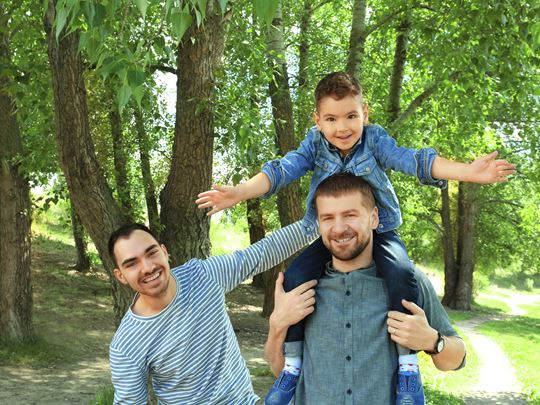Enriching the Lives of Young People
Whether single or in a relationship, people from the LGBTQIA+ community play an important role in providing loving homes for vulnerable young people in the UK. Let’s explore some of the amazing benefits which growing up in an LGBTQIA+ family can have for children in care.
1) Embracing diversity
Children in LGBTQIA+ households learn first-hand that their foster family is just like any other family. Growing up in a diverse and inclusive household can teach children to be open-minded towards people from all backgrounds and the importance of embracing and celebrating difference in all its wonderful forms.
2) Challenging prejudice
Being brought up in a diverse home can help to instil children with a strong sense that discrimination, in all its forms, is wrong. It can encourage children to develop the confidence to challenge prejudice when they encounter it in their own lives, or when they see others being discriminated against.
3) Self-love and acceptance
Out and proud foster parents are excellent role models to their children, showing them that they should never be afraid or ashamed of being who they are. The example set by LGBTQIA+ foster parents can teach children resilience and teach them to always celebrate what makes them unique.
4) Building community
Many LGBTQIA+ people form close familial and friendship bonds within their vibrant local communities. By becoming part of an LGBTQIA+ foster family, children have the opportunity to be embraced by a wider, close-knit support network. Many LGBTQIA+ foster parents also understand the importance of chosen family and show their children that family can be about more than just genetics: it’s about love, acceptance, and supporting one another.
5) Offering unique support to LGBTQIA+ youth
While foster parents from all backgrounds are able to provide an excellent quality of care to LGBTQIA+ children, queer foster parents can bring a unique perspective. Their own lived experience enables them to offer a deep level of empathy and understanding to children who may be beginning to question their sexuality or gender identity. This deep level of understanding can be especially valuable to children who may have been rejected by their birth families because of their identity.
Supporting an LGBTQIA+ Young Person
If a child in your care is LGBTQIA+ or is beginning to question their identity, you no doubt want to do your best to support them. Here are some useful tips to help you support an LGBTQIA+ young person.
1) Be curious
One of the best things you can do for your young person is to show a willingness to learn about their identity and their experiences. Online resources can be useful when striving to learn more about complex experiences such as gender transition, and can help you gain a better understanding of lesser known identities such as pansexuality, asexuality and aromanticism. Be sure to ask the child in your care appropriate questions and show active interest when they open up to you.
2) Make your home a safe space
Encourage open, non-judgemental communication in your household to make sure that your young person feels that it is safe to be themselves. Having somewhere safe to call home can be invaluable, particularly if your child is experiencing problems at school or feels unsafe because of their identity. Having access to a range of inclusive books and media in your home can also help your child to see themselves reflected in the world around them and normalise difference.
3) Be a source of strength for your young person
Being reliable and consistent is essential. By letting your child know that you will always advocate for their best interests, that you embrace their identity and that you will be there for them no matter what challenges they might face, you can help them to gain the confidence to embrace who they are.
4) Access support when you need it
Be sure to lean on your network of support when you face challenges. This includes your social worker, your child’s school, and your fostering agency. Whatever concerns you may have, we always encourage you to seek support from your social worker whenever you need it.
If you would like additional support, check out FFLAG’s website, a UK charity run by carers of LGBTIA+ youth. If you would like more advice on how to support a trans, non-binary or gender-questioning child in your care, contact the Mermaids charity.
Some children may require additional support when dealing with the social and emotional challenges which can arise while discovering their identity. You should be sure to seek the advice of your GP if you notice a change in your child’s mental health.
Become a Foster Parent Today
No two fostering families are the same, and that’s something which we at Orange Grove will continue to celebrate as we uplift the voices of our LGBTQIA+ foster families through Pride Month and beyond.
We encourage caring and dedicated people from all backgrounds to join this life-changing career, and are committed to making sure that all our foster parents feel welcomed and supported. If you believe that you could offer a child a place in your home, our team would love to help you to learn more about the process of becoming a foster parent.

